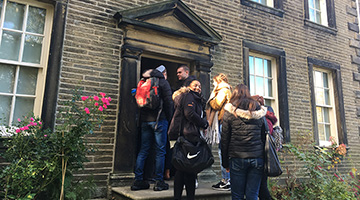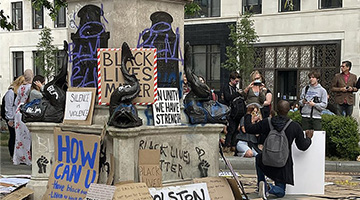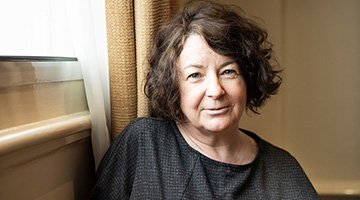Why study this course with LJMU?
- Opportunities to meet practising writers, publishers, agents, producers and directors
- Professional guidance and peer support to help you develop your writing to publishable standard
- Access to regular literary events, readings, screenings and open mic nights to showcase your work
- LJMU ranked 7th university in the UK for Creative Writing (The Times UK University Rankings 2025)
- 96% of students surveyed said teaching staff on this course were good at explaining things (National Student Survey 2024)
About your course
At LJMU, which developed the UKs first Single Honours Creative Writing course, we put an emphasis on a writer's career and take special care to instil not just the craft, but also the practical approaches needed to become a professional writer.
Our teaching team are all published authors who have written and contributed to textbooks about the craft and theory of writing, which are used in universities and colleges worldwide.
As a student on the BA (Hons) Creative Writing at Liverpool John Moores University you will hear from and work with prestigious visiting writers who regularly deliver readings and workshops on modules during our ‘Professional Practice Weeks’. Recent guests have included Rishi Dastidar, Ramsay Campbell, Andrew McMillan, Rebecca Goss, James Rice, Jennifer Delaney, and Okechukwu Nzelu.
During this degree, you will study prose, creative non-fiction, scriptwriting and poetry in your first year and go on to specialise in the disciplines that challenge you the most to produce your best work. Our acclaimed Writer at Work module engages specialists in digital publishing, arts-in-health, literature development and other areas giving you an in-depth understanding as well as experience of the writers professional world.
The degree is taught at the University's Mount Pleasant Campus, with academic offices in Redmonds Building located in the heart of Liverpool, a vibrant student city, renowned for its cultural events, readings, music events and art galleries. Liverpool is a city full of storytellers and we hope you will be adding to this richly creative environment.
Course modules
What you will study on this degree
Further guidance on modules
Modules are designated core or optional in accordance with professional body requirements, as applicable, and LJMU’s Academic Framework Regulations. Whilst you are required to study core modules, optional modules provide you with an element of choice. Their availability may vary and will be subject to meeting minimum student numbers.
Where changes to modules are necessary these will be communicated as appropriate.
Core modules
Observation and Discovery
20 credits
20 credits
The module encompasses intercultural and boundary spanning skills, professional written and spoken communication and collaboration between students as they are introduced to workshopping techniques.
Writers are Readers
20 credits
20 credits
This module helps students become better writers by reading and understanding different kinds of writing. They'll explore what they like to write about, become more confident in sharing their ideas, and learn how research can make their writing better. This course mixes reading, writing, and research to make students well-rounded writers who can create great stories and essays.
Character and Story
20 credits
20 credits
The module explores the building blocks of character development and character driven story lines through various forms of writing and requires the student to evidence a variety of research skills and evidence professional written and communication skills, and collaboration between students as they are introduced to workshopping techniques.
Story Origins
20 credits
20 credits
We will focus on the influence of Myth, Folk Tale and Metaphor and how these story structures and character archetypes have informed and continue to inform storytelling and creative writing. It will foster the students' ability to conduct independent research and then to use this to inform their creative and critical writing.
Language and Craft
20 credits
20 credits
As with other Level 4 modules, this module is designed to encourage consistent engagement, with smaller assessment items that build on each other in terms of attention to language and form, providing both summative and formative feedback. This module aims to develop student skills in textual analysis and academic writing skills.
Professional Practice: The Writer in the World
20 credits
20 credits
The module widens the student's experience of cultural activities, developing cultural capital, and helps embed a sense of a learning community/cohort through shared experiences.
Optional Modules
Script Development
20 credits
20 credits
Students will workshop their writing in tutor-led and peer-led sessions, offering and receiving constructive criticism, reading and performing key scenes from their scripts and re-drafting and developing their work. They will also share insights into their ongoing research process with peers. Industry guest speakers will also share their knowledge and experience in seminars and masterclasses.
Short Fiction
20 credits
20 credits
This module expands students' understanding of short fiction and fosters independent reading. It supports their short story writing skills, enhancing their creative confidence and critical insights. Students learn to think creatively about the possibilities of short story writing and develop their ability to evaluate both published authors and peers constructively. Through workshops and essays, students gain a strong foundation in narrative craft, preparing them for more advanced prose modules at Level 6.
Poetry
20 credits
20 credits
This module has creativity embedded throughout, with a heightened awareness of written and spoken communication and the power of language. Poems are designed to be heard as well as read. Students will be reading their own draft poetry aloud in class, thus developing self-confidence in their own voices and work.
Creative Non-fiction
20 credits
20 credits
The module will include a diverse range of texts that promote intercultural understanding. Boundary spanning skills will be developed across the many forms of creative non-fiction and an exploration of the writerly techniques they value.
Screenwriting
20 credits
20 credits
Students will workshop their writing in tutor-led and peer-led sessions, offering and receiving constructive criticism, reading and performing key scenes from their scripts and re-drafting and developing their work. Industry guest speakers will also share their knowledge and experience in seminars and masterclasses.
Writing for Stage & Radio
20 credits
20 credits
In this module, students will learn scriptwriting for radio and stage, focusing on modern techniques. They'll explore these forms through reading and listening, and develop their work collaboratively in a writers' room. Students will also improve their communication skills, refining their scripts through workshops and industry expert input in seminars and masterclasses.
Writing in Production
20 credits
20 credits
The module embeds key employability skills: leadership and motivational skills, analysis and problem-solving, creativity and enterprise, professional written and spoken communication, financial literacy, planning and organisation, digital capability and teamworking and collaboration.
The Fantastic
20 credits
20 credits
The module will engage students in the study of fantasy, horror and science fiction literature and related arts. This has proven the most popular genre amongst undergraduate students and the module provides an opportunity for experimentation with a range of writing styles leading to specialisation in one genre area. Students will produce original, creative work informed by their studies, and present it to their classmates and tutors for formative feedback and further development.
Approaching Your Novel
20 credits
20 credits
In this module, students will learn how to propose novels effectively, understand their target market, and master the art of crafting compelling opening chapters. They'll also explore various novel genres and develop essential narrative skills. Through peer workshops and hands-on practice, students will prepare work suitable for the publishing industry, all while gaining valuable insights into genre, market, and narrative craft.
Student Semester Abroad - Creative Writing
60 credits
60 credits
This is an opportunity to spend one semester of your second year at one of LJMU's partner universities around the world.
Study Year Abroad - Creative Writing
120 credits
120 credits
This module aims to provide students with an additional year of study at an approved overseas partner that will complement their studies in Liverpool.
AI and the Humanities
20 credits
20 credits
This module speaks to the developing relevance and significance to the Humanities and society more generally of AI tools. It addresses both cultural, critical and creative aspects of AI alongside developing students’ AI skills.
Optional Modules
Advanced Script Workshop 1
20 credits
20 credits
In this module, students are encouraged to advance the work-shopping skills that they have developed over the previous four semesters to give and receive constructive criticism in peer-led sessions as well as tutor-led work groups. Key employability skills are embedded throughout. These include: analysis, problem-solving & decision-making, communication, ICT, numeracy & financial literacy, planning & organisation and team work and collaboration, as well as creativity and enterprise.
Advanced Script Workshop 2
20 credits
20 credits
The module is the last step before students either enter the industry or move on to Masters level. In this module, they are encouraged to use the work-shopping skills that they have developed over the previous five semesters to give and receive constructive criticism in peer-led sessions as well as tutor-led work groups. Key employability skills are embedded throughout. These include: analysis, problem-solving and decision-making, communication, ICT, numeracy and financial literacy, planning and organisation and team work and collaboration, as well as creativity and enterprise.
Advanced Poetry Workshop 1
20 credits
20 credits
The focus on published collections encourages students to focus on how a poet's'voice' is developed and how individual poems are collated to inform the collection asa whole.
Advanced Poetry Workshop 2
20 credits
20 credits
Students will be working at an advanced level, demonstrating the skills both critical and creative necessary to succeed in the world of contemporary poetry. Work-based learning will be included in student interaction with guest speakers – poets who are published and viewed as leading writers in their field.
Advanced Prose Workshop 1
20 credits
20 credits
This module is designed to encourage the student to use the technical, cognitive and narrative skills they have acquired to produce a writing portfolio and reflection, using their own strengths and those of the community of writers of which they are a part.
As the workshops are based each week on prepared readings of peer students' draft work, suggestions for wider reading and giving thoughtful and detailed critiques, a student's individual contribution is of great importance. The portfolio may consist of fiction or creative non-fiction. The research portfolio further develops good habits in terms of writing for publication and understanding the market.
Advanced Prose Workshop 2
20 credits
20 credits
This module is designed to encourage the student to use the technical, cognitive and narrative skills they have acquired to produce a writing portfolio and reflection, using their own strengths and those of the community of writers of which they are a part. As the workshops are based each week on self-chosen areas of writerly concern and prepared readings of peer students' draft work, suggestions for wider reading and giving thoughtful and detailed critiques, a student's individual contribution is of great importance. The students will have the opportunity to work in a team and to take a leadership role. The portfolio may consist of fiction or creative non-fiction. The reflective essay further develops understanding of writing as a craft, examining both theory and technique, with application to the student's own creative practice.
Digital Writing
20 credits
20 credits
This module enables students to develop an understanding of writing for digital platforms and skillsets necessary to produce digital content. Over the semester students will not only discover the creative possibilities of writing for online platforms but also the career opportunities in this field of writing. The module will look at diverse areas of text and writing online, from media characters portrayed in social networking, bloggers, viral campaigns, podcasts, music production and participatory projects to location based storytelling. The module is open to new and emerging possibilities and platforms.
Writer at Work: Portfolio
20 credits
20 credits
The module will be a mix of class and group activities, sessions with guest speakers, and independent research and planning. It will draw on the expertise of the university's Student Futures team, alongside the subject-specific knowledge of the module teaching team, and a range of guest speakers from the creative industries, to deepen students' understanding of potential employment opportunities and to help them map and plan their own routes towards this. Through a series of guided activities, students will be enabled to reflect on their existing skills and experience, identify areas for development, and explore ways of presenting themselves as writers and creative-industry professionals. They will also develop their skills in research, analytical writing and clear written communication, through researching case studies in the creative industries and writing these up in a comparative analytical study.
Writer at Work: Project
20 credits
20 credits
This module builds on key employability skills providing a work-based learning opportunity whilst also continuing to develop students' skills in research and analytical writing suitable for postgraduate study.
Independent Study
20 credits
20 credits
This module allows students to pursue an individually devised creative project in Creative Writing at an advanced level. Students who wish to take this module will apply in writing and their application may be refused. Students on the module submit a proposal to the module leader who then offers their comments, refining the objectives of the study into an agreed form, at which stage the module leader assigns the student a supervising tutor. The module provides the student with an opportunity to pursue a project which is not accommodated elsewhere in the programme.
Creative Writing Work Based Learning
20 credits
20 credits
This module provides Creative Writing students with the opportunity to widen their direct knowledge of working practices within a field where they can use the skills acquired on their programme, to widen their contacts and to assess their skills within an experiential context. Students negotiate a learning contract with an employer and a tutor and are assessed on their written account of the content and relevance of their work experience to the Creative Writing degree.
Developments in Contemporary Writing and Publishing
20 credits
20 credits
This module delves into contemporary literature, covering fiction, non-fiction, and poetry, and explores current debates in the English-speaking publishing world. It emphasises how production circumstances shape contemporary texts and encourages reflection on the writer's role in modern society. Topics include women's history in the era of #Me Too, climate fiction, diversity in publishing, gender identity, freedom of speech, 'cancel culture,' and pandemic writing. Students will engage with works by various authors such as Hallie Rubenhold, Reni Eddo-Lodge, and Akwaeke Emezi.
Professional accreditation/links
Liverpool has a strong cultural and literary tradition and LJMU is proud to have connections with many local arts institutions such as Tate Liverpool, FACT, the Everyman and the Bluecoat.
Our connections go much wider than Liverpool however: staff and students have had novels, short stories and poetry published by leading UK and international houses, and radio plays, short films and features broadcast and screened in the UK, Europe and America.
Your Learning Experience
Excellent facilities and learning resources
We adopt an active blended learning approach, meaning you will experience a combination of face-to-face and online learning during your time at LJMU. This enables you to experience a rich and diverse learning experience and engage fully with your studies. Our approach ensures that you can easily access support from your personal tutor, either by meeting them on-campus or via a video call to suit your needs.
Your studies will be divided between formal study in the form of lectures, workshops and tutorials, reading, writing, online activities and completing independent study tasks.
You will engage in intensive writing practice and extensive reading and interact with a community of published and performed writers.
The programme will help you to develop your creative skills as well as the intellectual and analytical skills to improve your work.
You will have a chance to showcase your work at regular literary events, readings, screenings and open mic nights at FACT, The Everyman, Tate Liverpool and the Bluecoat.
Work-related Learning
The third year Writer at Work module gives you a chance to step inside the writers world by pursuing your own project, be it organising a poetry festival, placing the idea for a novel with a literary agent, or planning the production of a film.
Dedicated personal tutor, plus study skills support
Together with your tutors and fellow students, you will become part of a supportive and creative writing community that continually learns from and inspires each other. The course has a real ethos of aspiration and achievement and you will be encouraged throughout to be the very best writer that you can, with continual feedback on your work from tutors or peers.
Your final year is the time when you have to really refine your work and take responsibility for your own writing future, and with this in mind you will be encouraged to use your tutors in the role of publisher, producer, script editor or agent.
Assessment varies depending on the modules you choose, but will usually include a combination of exams and coursework.
Around 50% of your coursework will be original creative work such as a portfolio or project and 50% will be essays, commentaries, class-contributions, peer critiques, pitches, presentations, learning logs, group work, treatments, journals or class tests. You will normally be given two or three different assessment tasks per module. In your final year, your creative work or project will normally account for 70% of the course with the remaining 30% taking the form of critical commentary or reflective analysis.
Your tutors will provide feedback on assessments within 15 working days, but they will also provide constructive feedback on draft creative work throughout the course. You will have the guidance of a personal tutor with whom you can discuss your marks and overall personal and/or academic progress at any time. Peer review is also an important aspect of this course and is actively encouraged.
Where you will study
The School is based in the John Foster Building, with teaching taking place in the John Foster and the Redmonds Building, in the heart of the bustling Mount Pleasant Campus and Liverpool's growing Knowledge Quarter. The Redmonds Building is home to high quality lecture theatres and seminar rooms, TV studios, radio suites, green screen, editing rooms and newsrooms, social spaces, and a café. It is only a short walk from LJMUs Aldham Robarts Library, which contains all the resources you will require for your studies, and is open 24 hours a day, seven days a week.


I've really enjoyed my experience as a student. I've learnt what it's like to live as a writer, and not just a person who writes. The tutors were friendly and gifted, and I felt lucky to be studying with such experienced writers. LJMU has been vital in establishing a network of writers that I can carry throughout my career.
Career paths
Our graduates go on to work in a wide variety of careers including:
- broadcasting
- business
- copywriting (in advertising and social media)
- journalism
- marketing
- proofreading and editing
- publishing
- teaching
- website authoring
Some have also become professional writers and had their work filmed, staged, published and performed.
This degree also offers direct progression routes onto our MA Writing and MA Screenwriting courses, where you can further develop your writing.
Student Futures - Careers, Employability and Enterprise Service
A wide range of opportunities and support is available to you, within and beyond your course, to ensure our students experience a transformation in their career trajectory. Every undergraduate curriculum includes Future Focus during Level 4, an e-learning resource and workshop designed to help you to develop your talents, passion and purpose.
Every student has access to Careers Zone 24/7, LJMU's suite of online Apps, resources and jobs board via the LJMU Student Futures website.
Tuition fees and funding
- Full-time per year:
- £9,535
The University reserves the right to increase tuition fees in accordance with any changes to the maximum allowable fees set by the UK Parliament. In the event of such a change, any fee increase will be subject to a maximum cap of 10% of the total course cost as originally stated at the time of your offer.
The fees quoted above cover registration, tuition, supervision, assessment and examinations as well as:
- library membership with access to printed, multimedia and digital resources
- access to programme-appropriate software
- library and student IT support
- free on-campus wifi via eduroam
Additional costs
Although not all of the following are compulsory/relevant, you should keep in mind the costs of:
- accommodation and living expenditure
- books (should you wish to have your own copies)
- printing, photocopying and stationery
- PC/laptop (should you prefer to purchase your own for independent study and online learning activities)
- mobile phone/tablet (to access online services)
- field trips (travel and activity costs)
- placements (travel expenses and living costs)
- student visas (international students only)
- study abroad opportunities (travel costs, accommodation, visas and immunisations)
- academic conferences (travel costs)
- professional-body membership
- graduation (gown hire etc)
Funding
There are many ways to fund study for home and international students. From loans to International Scholarships and subject-specific funding, you'll find all of the information you need on our specialist funding pages.
- Full-time per year:
- £17,750
International Scholarships and payment plans
Liverpool John Moores University is committed to supporting international students by providing a range of scholarships and flexible payment plans to help students manage their tuition fees.
Scholarships
LJMU provides a variety of scholarships to support international students. Scholarships are available to self-funded students who have accepted their offer and met all the conditions outlined in their offer letter. Students must also demonstrate that they can cover living costs, travel, and other expenses associated to studying at the university. Postgraduate scholarships include tuition fee reductions and are often offered in partnership with external funding organisations.
All self-funded international students are eligible for an automatic scholarship worth up to £4,000. For more details and to view our full list of scholarships, visit the international scholarship webpages.
Deposit
All students must pay a £5,000 deposit before they can receive their CAS letter.
For more information view our deposit page.
Tuition Fee Payment Plan
After paying their £5,000 deposit, students have the option to pay their fees in full or in three equal instalments minus any internal scholarships and discounts. There are two payment options available for international students. You can either pay your tuition fees in full before enrolment or opt for a payment plan. With the payment plan, you can pay your fees in three instalments after making your £5,000 deposit. The first instalment is due before enrolment.
All payments should be made through Flywire. Full details can be found in the How to Pay Guide.
Early Bird Tuition Fee discount
We are excited to introduce a £500 Early Payment Discount to all self-funded international students. Eligible self-funded students who pay their fees by the required deadlines will get a discount which will be automatically deducted from the 1st year of tuition fees.
To see the required deadlines please visit the webpage
Entry requirements
Please choose your qualifications below to view requirements
Grades/points required from qualifications: BCC - BBB (104 - 120)
Work out how many UCAS points your qualifications are worth by visiting the UCAS Tariff Calculator.
Qualification requirements
GCSEs and equivalents
Prior to starting the programme applicants must have obtained Grade C or Grade 4 or above in English Language and Mathematics GCSE or an approved alternative qualification below:
- Key Skills Level 2 in English/ Maths
- NVQ Level 2 Functional skills in Maths and English Writing and or Reading
- Skills for Life Level 2 in Numeracy/English
- Higher Diploma in Maths/ English
- Functional Skills Level 2 in Maths/ English
- Northern Ireland Essential Skills Level 2 in Communication or Application of Number
- Welsh GCSE in Maths or Numeracy
- Wales Essential Skills Level 2 in Communication or Application of Number
A levels
- Minimum number of A Levels required: 2
- Is general studies acceptable? Yes
- Average A Level offer: BCC
- Are AS level awards acceptable? Acceptable only when combined with other qualifications
- Maximum AS Level points accepted: 20
BTECs
Extended Diploma: DMM
Access awards
- Access to Higher Education Diploma acceptability: Acceptable on its own and combined with other qualifications
- Further information: At least 9 Distinctions and 36 Merits, or any other combination that equates to 104 UCAS Tariff points
International Baccalaureate
- International Baccalaureate: Acceptable on its own and combined with other qualifications
- Additional information: 104 UCAS Tariff points from IB Composite parts, or in combination with other Level 3 qualifications
Irish awards
- Irish Leaving Certificate: Acceptable on its own and combined with other qualifications
- Grades / subjects required: 104 UCAS Tariff points with a maximum 20 UCAS Tariff points from Ordinary Level
Welsh awards
- Welsh Baccalaureate: Acceptable only when combined with other qualifications
T levels
104 UCAS Tariff points in a related subject.
Alternative qualifications considered
Applications are welcomed from mature and non standard applicants who will be considered on an individual basis.These applicants should demonstrate potential and motivation and/or have relevant experience and may be required to submit an essay and/or attend an interview.
International Applicants: We welcome overseas applicants who will be considered in line with UK entry requirements.
Further information
-
DBS, Occupational Health requirements
Application and Selection
Securing your place at LJMU
All applicants should possess the following essential qualities: You will have a strong desire to develop your breadth and depth of reading fiction and/or poetry, and/or a strong interest in film, theatre, or radio. You will have a desire to write in different forms and genres and be open to the idea that, through reading and writing and studying the craft of writing, you can become a better writer. You will be able to work on your own and as part of a group. You will have good communication skills and a willingness to contribute to tutorials, seminars and workshops.
Can this course be deferred?
Yes
-
Reduced offer scheme
As part of LJMU’s commitment to widening access we offer eligible students entry to their chosen course at a reduced threshold of up to 16/8 UCAS points. This applies if you are a student who has been in local authority care or if you have participated in one of LJMU’s sustained outreach initiatives, e.g. Summer University. Please contact the admission office for further details.
International requirements
IELTS
6.0 (minimum of 5.5 in each component) or equivalent English language proficiency test.
Further information
-
DBS, Occupational Health requirements
Application and Selection
Securing your place at LJMU
All applicants should possess the following essential qualities: You will have a strong desire to develop your breadth and depth of reading fiction and/or poetry, and/or a strong interest in film, theatre, or radio. You will have a desire to write in different forms and genres and be open to the idea that, through reading and writing and studying the craft of writing, you can become a better writer. You will be able to work on your own and as part of a group. You will have good communication skills and a willingness to contribute to tutorials, seminars and workshops.
Can this course be deferred?
Yes
Please Note: All international qualifications are subject to a qualification equivalency check.
How to apply
Securing your place at LJMU
UCAS is the official application route for our full-time undergraduate courses. Further information on the UCAS application process can be found here https://www.ljmu.ac.uk/study/undergraduate-students/how-to-apply.
Applications are welcomed from mature and non-standard applicants who will be considered on an individual basis. These applicants should demonstrate potential and motivation and/or have relevant experience and may be required to submit an essay and/or attend an interview.
International Applicants: We welcome overseas applicants who will be considered in line with UK entry requirements.
Your university life
From accommodation and academic support to clubs and societies. Find out what LJMU has to offer.
Related Links
Talk to our students
Connect with a current LJMU student for advice and guidance on university life, courses and more.
See what our students are saying
At LJMU we want you to know you're making the right choice by studying with us. You can see what our students are saying about their experience with us through their reviews on the following websites:
Related Links
News and views
Browse through the latest news and stories from the university
The university reserves the right to withdraw or make alterations to a course and facilities if necessary; this may be because such changes are deemed to be beneficial to students, are minor in nature and unlikely to impact negatively upon students or become necessary due to circumstances beyond the control of the university. Where this does happen, the university operates a policy of consultation, advice and support to all enrolled students affected by the proposed change to their course or module.
Further information on the terms and conditions of any offer made, our admissions policy and the complaints and appeals process.






















